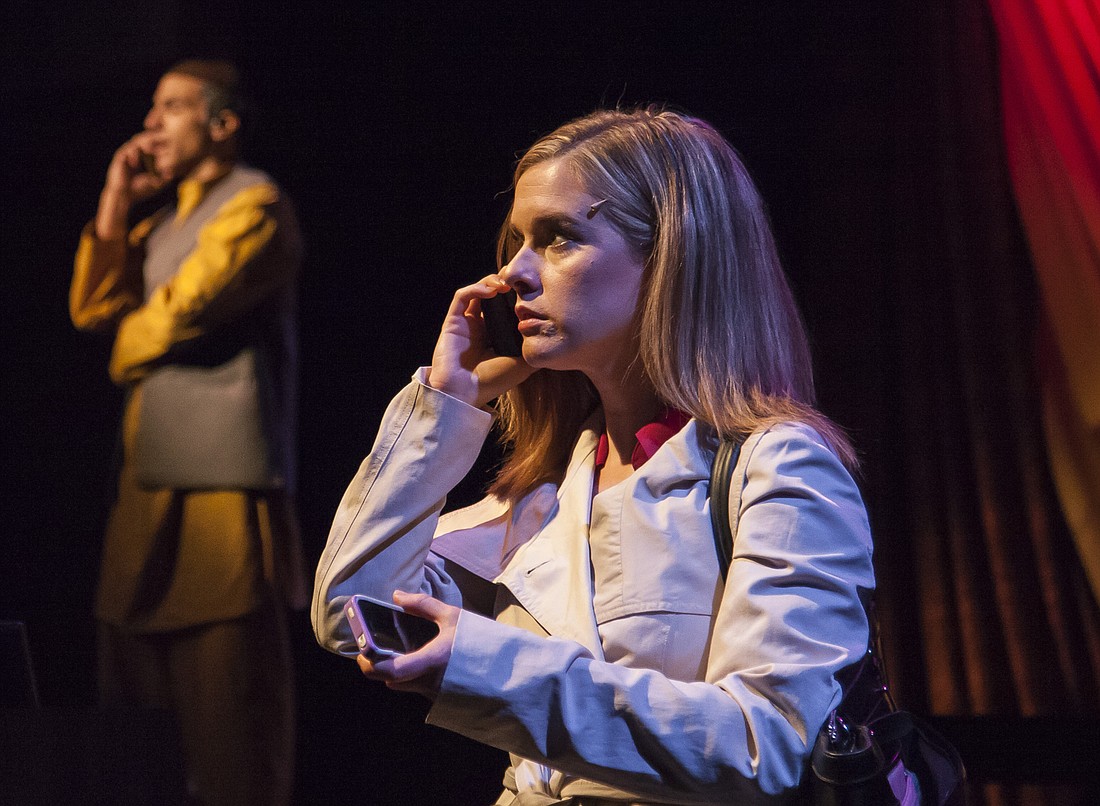- November 22, 2024
-
-
Loading

Loading

Sarah Bierstock’s “Honor Killing” is a crime story. It explores a reporter’s struggle to expose the perpetrators and enablers of an ugly mob killing — and the hall of mirrors she enters in pursuit of the truth.
The reporter is Alliysn Davis (Rachel Moulton), a foreign correspondent for The New York Times. The titular crime is a brutal “honor killing” in contemporary Pakistan. (A mob of family members stoned a woman to death outside Lahore’s high court. A line of police officers watched and did nothing.) Allisyn flies into that country to get the facts and doesn’t make it past the airport. (She’s been blacklisted — in mid-air — because of her recent editorial on Sharia law and other writings.) Alliysn takes a return flight to Dubai and books a hotel room. She reluctantly contacts Ben Adams (Michael Sweeney Hammond), her colleague and old flame. Ben agrees to go to Pakistan to be Allisyn’s eyes and ears. And that’s when she enters the mirror maze …
Although Allisyn is physically stuck at the Dubai Marriott, she can run the story by remote control, thanks to 21st-century communications tech. Smartphones and Skype open virtual windows to Ben and other human assets in Pakistan. They feed Allisyn bits of information. She pieces it all together, and the truth isn’t neat or pretty. Her tidy storyline turns muddy. The line between good guys and bad guys blurs. The crusading reporter’s claim to noble intentions is also suspect.
Mehreen (Devon Ahmed), Allisyn’s contact in the progressive Pakistan People’s Party, openly questions her motives: “I mean, sorry to be blunt, but what is your angle? Another episode of the noble, white American sweeping in to save the poor brown people? Brown women, more specifically?”
To further muddy the waters, the grieving widower of the murdered woman turns out to be less than sympathetic. The Consul General also threatens the lives of Allisyn’s people in Pakistan. A veiled threat, but barely. It all adds up to two harsh questions …
Is this story worth that risk? Does Allisyn have a right to tell it?
Director Richard Hopkins pursues the answers in a surreal montage. Action in “the real world” is interspersed with the chimes of Skype announcing a parade of faces on ubiquitous pop-up screens. (Kudos to Rocco DiSanti for the trip through the high-tech looking glass.) In the 21st century, being in two places at once is no big deal. Allisyn and her contacts are neither here nor there.
Moulton’s Allisyn has nuance and depth. She thinks on her feet and thinks fast, and she saves her feelings for later. Her character’s a pro, but she’s far more than a generic plucky reporter. Allisyn has her own inner demons, but fights them when they threaten her objectivity. Hammond’s Ben is a nice guy with a few male chauvinist blind spots. Allisyn pushes him away, opens her heart, and then pushes him away again. Ben’s love and loyalty is a one-way street. It’s a good performance, although he never gets to be more than the guy-who’s-always-there. Ahmed’s Mehreen comes off as strident on her first Skype call. She pulls it back on her second vid chat, sounding more like a blunt friend than a nagging scold. J. Paul Nicholas does a chameleon-like turn as several very different characters, including Abbas, a dedicated Pakistani activist; the thuggish-yet-slick Pakistani diplomat; and the grieving, grievous widower. Maria Couch is sympathetic as Melissa, Allisyn’s expectant sister on the other side of the planet. William Langan is credibly stuffy and self-serving in his few brief scenes as Allisyn’s New York Times editor.
Isabel and Moriah Curley-Clay's set is a hotel suite that doubles as the world. With the aid of DiSanti’s ubiquitous video screens and projections, they cleverly evoke the sense of a place that’s both everywhere and nowhere. Susan Angermann’s costumes fit the needs of hardworking (or unemployed) people who don’t care what they look like. (With the exception of the preening Pakistani diplomat and Allisyn’s stuffy editor.)
It’s a gripping play, though the narrative loses its grip in the final scenes. The narrative wraps up with a revelation (concerning Allisyn’s back story) and a shocking crime (the price of telling this news story). It’s all very moving, but oddly anticlimactic.
There’s no clear turning point or resolution to the play’s big questions. Allisyn never openly decides: “Yes, this story is worth it. Yes, I have the right to tell it.” Her decision is implied, but never spelled out.
Allisyn doubts her right to tell the story of this honor killing. She finally overcomes her doubts and tells it anyway. That decision is glossed over. I’d make it more of a big moment. It feels like the organic climax of the play.
Bierstock’s hall of mirrors is still compelling. “Honor Killing” conveys the hard work of real reporting today — and the dilemmas that real reporters face. Hidden cultural bias is one. False certainty is another. Instant connectivity creates the illusion of living in Marshall McLuhan’s global village. It’s still no substitute for actually being in the places you write about. Skype, YouTube and CNN show you the world, but it’s never the whole picture.
As Mark Twain once wrote, “All generalizations are false, including this one.”